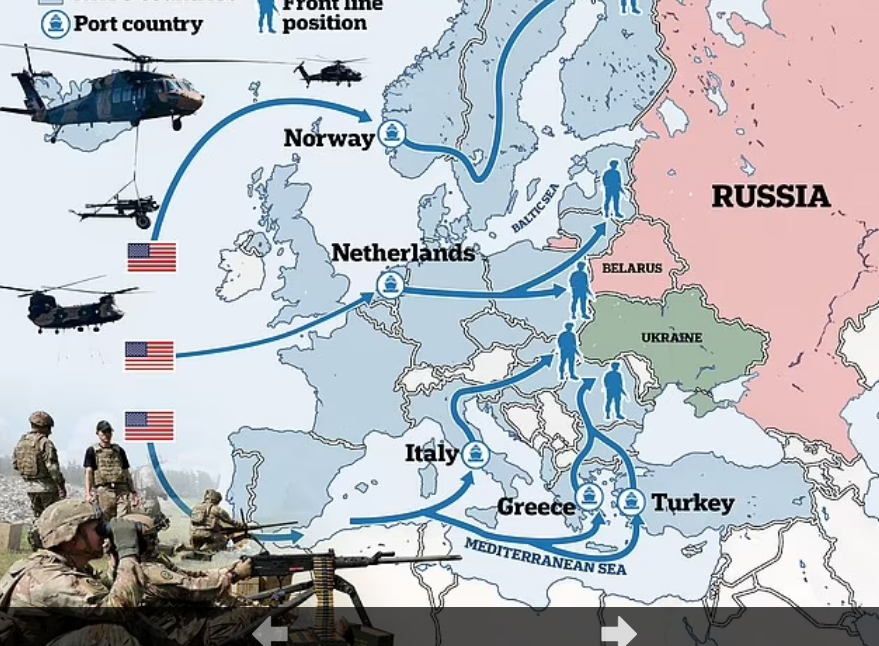
NATO plan to bring US troops to front lines to fight Russia revealed: Alliance prepares for rapid deployment of US forces amid fears Moscow is planning a major war with Europe
NATO leaders agreed earlier to prepare 300,000 soldiers for rapid deployment
Analytically:
NATO is making plans to send US troops to the front lines in Europe in the event of an all-out conflict with Russia, it has been revealed.
As revealed by The Telegraph, the new land corridors have been created so that US forces can be quickly moved to the EU border with Russia in the event that the war spreads beyond Ukraine.
New “land corridors” are being created to move troops quickly into central Europe without local bureaucratic hurdles, allowing NATO forces to be deployed at a moment’s notice if Putin’s disastrous war in Ukraine moves west.
American forces will land in Europe through five ports in Norway, the Netherlands, Italy, Greece and Turkey. Then, via the intermediate countries, they will reach Ukraine, Finland, Poland, Latvia and Lithuania, as can be seen in the related map created by the Daily Mail.
NATO plans in case of war – what they offer
Plans call for expanding the corridors out of the Netherlands, which has until now been the main entry point for US forces. As reported, US and NATO forces will be deployed “on the front lines and will be transported through ‘NATO land corridors’ in the event of war in Europe.”
Officials said that US forces and armored personnel carriers will disembark at five ports and follow specific routes. Logistics routes have become a major priority within the Alliance.
According to the plans, American forces would first land in Dutch ports and then travel by train through Germany to Poland.
Since ports in northern Europe are expected to be bombed or destroyed by Russian bombing, the coalition will also use ports in Italy, Greece and Turkey.
The goal is to ensure that the movement of troops and logistical equipment can be completed even if one of the support lines is interrupted by strikes. From Italian ports, US forces can be transported through Slovenia and Croatia to Hungary, which borders Ukraine.
Greece entanglement!
The plans also call for the transfer of troops from Greek ports via Bulgaria and Romania.
It is also planned to land troops in the ports of southern Türkiye and from there to Bulgaria.
The plan ends with landing and moving through Norway, Sweden and Finland.
These ports, says the Telegraph, are particularly vulnerable to Russian missile attacks, and special attention should be paid to air defense and “corridor” security!
The goal is to ensure that nothing and no one can stop or delay the transfer of troops. Each path can function individually, as an alternative, or simultaneously for a faster and greater boost to the front line.
It should be noted that the leaders of NATO member states have already agreed to prepare a force of 300,000 soldiers, who will be on high alert so that they can be immediately put into operational operations. Recently, large military maneuvers have taken place, indicating global war scenarios.
The Kremlin threatens the West, and NATO threatens Russia
Meanwhile, Russia continues to build up its forces on its borders. According to the Royal United Services Institute (RUSI), by the beginning of this year there were 470,000 soldiers on the front lines to meet the needs of the war in Ukraine.
NATO Deputy General Alexander Solfrank, head of the alliance’s Logistics Command, expressed concern about “observing that Russia attacked logistics bases in Ukraine. Large bases like those in Afghanistan and Iraq are clearly vulnerable, because they will be destroyed in the very early stages of the conflict.”
The generalized conflict between Russia and the West continues and even escalates. Many Western leaders assert that Europe must prepare for a war of this scale, and there are increasing calls for greater Western involvement in the war in Ukraine – even by sending troops.
Already, the United States and other European allies have given Kiev the green light to launch strikes with Western weapons inside Russia, even near the border with Kharkiv. It is a move that Vladimir Putin warned could have “deadly consequences.” It is characteristic that the Russian President asked himself: “If such dangerous consequences occur in Europe, how will the United States behave, taking into account our parity in the field of strategic weapons?”
It is noteworthy that Moscow warned that if it saw itself facing an “existential threat,” it would not hesitate to use nuclear weapons.
The first strike against Ukraine inside Russia with Western weapons
On Tuesday, Kiev announced in celebration that it had struck the S-300 missile system inside Russia. At this point, the mandate given to Ukraine has clear limits, stipulating the use of shorter-range missiles and directing strikes inside Russia but close to the Ukrainian border, in Kharkiv.
However, a review of the position of the West, which has so far rejected any such possibility for fear of uncontrolled escalation, represents a pivotal change in strategy, as the tide of war has recently appeared to be clearly tilting in Moscow’s favor.
The Russian advance in Kharkiv and the territorial gains made by the Russian army on the Eastern Front, coupled with the poor state of Ukrainian forces, prompted the West to overcome the “taboo” regarding attacks inside Russia, opening a new chapter that ignites fears of a global shift. conflict.

“Hipster-friendly coffee fanatic. Subtly charming bacon advocate. Friend of animals everywhere.”





More Stories
F-16 crashes in Ukraine – pilot dies due to his own error
Namibia plans to kill more than 700 wild animals to feed starving population
Endurance test for EU-Turkey relations and Ankara with Greece and Cyprus